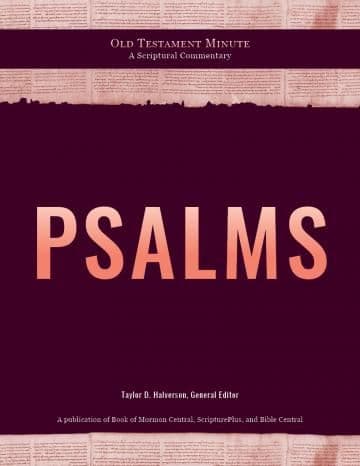Book
10 Chapters

Psalms 25–31 are notable for their focus on themes of covenant and temple. According to Psalms scholar Peter Craigie, Psalms 25 and 28 should be understood in the context of a covenant-making ceremony (see, for example, verses 10, 14). Craigie commented as follows, highlighting the theme of trust found in these psalms:
The attitude of trust is the key to the psalmist’s preparation, for trust signifies dependence and hope based upon the covenant character of God. He trusts because God is faithful as the God of the covenant promises; he trusts because those who have trusted in the past have experienced the presence and help of God.[fn]Peter C. Craigie and Marvin E. Tate, Psalms 1–50, 2nd ed. (Grand Rapids, MI: Zondervan, 2004), 218.[/fn]
As part of this covenant-making process, the psalmist typically does five things:
These elements are not necessarily found in this order and are not always clear in Psalm 25 due, in part, to the fact that this psalm is one of a handful of acrostic psalms. This means that the first letter of each line in Hebrew sequentially follows the Hebrew alphabetic order; therefore the twenty-two verses of Psalm 25 correspond to the twenty-two letters of the Hebrew alphabet. This form restricts what the psalmist can write in each line.
The fact that these psalms deal with temple and covenant themes should emphasize to us the idea that the temple is truly a place of peace and refuge from the storms of our lives and that there is safety and direction in keeping the covenants that we make there. Building faith in God’s promises leads us to trust in His lovingkindness.
Another feature of Psalm 25 that Latter-day Saint readers may notice is its affinity to Nephi’s Psalm in the Book of Mormon (2 Nephi 4:16–35). Kenneth Alford and D. Bryce Baker have highlighted similarities in the structure and language of 2 Nephi 4 to wording found in the sequence of Psalms 25 to 31. Most of these psalms are individual laments and songs of praise and thanksgiving to the Lord. Individual laments generally have a recognized structure, which is composed of five standard units: (1) invocation, (2) complaint, (3) confession of trust, (4) petition, and (5) vow of praise. We see these also in 2 Nephi 4:
Some parallels between Psalm 25 and Nephi’s Psalm are listed below:
| Psalm 25:2: | O my God, I trust in thee |
| 2 Nephi 4:19, 34: | Nevertheless, I know in whom I have trusted; O Lord, I have trusted in thee, and I will trust in thee forever |
| Psalm 25:4–5: | Shew me thy aways, O Lord; teach me thy paths; Lead me in thy truth, and teach me |
| 2 Nephi 4:33: | Wilt thou make my path straight before me! Wilt thou not place a stumbling block in my way—but that thou wouldst clear my way before me |
| Psalm 25:6: | Remember, O Lord, thy tender mercies and thy loving kindnesses, for they have been ever of old |
| 2 Nephi 4:26: | [The Lord] hath visited men in so much mercy |
| Psalm 25:7: | Remember not the sins of my youth, nor my transgressions: according to thy mercy remember thou me for thy goodness’ sake, O Lord. |
| 2 Nephi 4:17–19: | O wretched man that I am! Yea, my heart sorroweth because of my flesh; my soul grieveth because of mine iniquities. I am encompassed about, because of the temptations and the sins which do so easily beset me. And when I desire to rejoice, my heart groaneth because of my sins; nevertheless, I know in whom I have trusted. |
| Psalm 25:16: | I am desolate and afflicted |
| 2 Nephi 4:20, 29: | Mine afflictions |
| Psalm 25:17–18: | The troubles of my heart are enlarged. . . . Look upon mine affliction and my pain; and forgive all my sins |
| 2 Nephi 4:17–19: | My soul grieveth because of mine iniquities; my heart groaneth because of my sins |
| Psalm 25:19: | Consider mine enemies; for they are many; and they hate me with cruel hatred |
| 2 Nephi 4:22, 33: | He hath confounded mine enemies, unto the causing of them to quake before me; O Lord, wilt thou make a way for mine escape before mine enemies! |
| Psalm 25:20, 22: | O keep my soul, and deliver me; Redeem Israel, O God, out of all his troubles |
| 2 Nephi 4:31: | O Lord, wilt thou redeem my soul? |
Readers can draw deep spiritual strength from psalms like Psalm 25 and Nephi’s Psalm by relating to the five phases typically present in the covenant language of the psalms. By comparing the psalms with Nephi’s words in 2 Nephi 4, readers can see that Nephi was a skilled author and a brilliant student of the scriptures. All his writings regularly demonstrate his ability to integrate scriptural words and phrases. The fact that the Psalm of Nephi borrows so extensively from many different biblical psalms is evidence that Nephi knew and cherished many of the biblical Psalms and that he joyously used them in his daily life and writing. Clearly, the inspired words of the scriptures, including the psalms, were dear and comforting to Nephi.[fn]See Book of Mormon Central, “Is ‘Nephi’s Psalm’ Really a Psalm? (2 Nephi 4:16–17),” KnoWhy 30 (February 10, 2016), online at https://knowhy.bookofmormoncentral.org/knowhy/is-nephis-psalm-really-a-psalm.[/fn]
Book
10 Chapters
Items in the BMC Archive are made publicly available for non-commercial, private use. Inclusion within the BMC Archive does not imply endorsement. Items do not represent the official views of The Church of Jesus Christ of Latter-day Saints or of Book of Mormon Central.